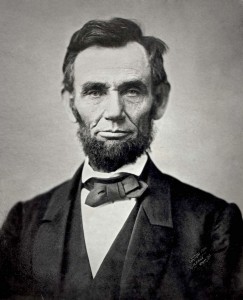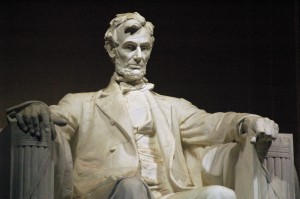 Lincoln’s Birthday is a legal holiday in some U.S. states, observed on the anniversary of Abraham Lincoln’s birth on February 12, 1809. Arizona, California, Connecticut, Illinois, Indiana, Missouri, and New York observe the holiday. New Jersey formerly observed the holiday, but on September 29, 2008, the Senate and General Assembly of New Jersey enacted The Public Employee Pension and Benefits Reform Act of 2008 (Section 36 of P.L.1995, c.259 (C.52:14-17.31a)) eliminating Lincoln’s Birthday as a public holiday for the purposes of conducting State government business, an act which also amended and supplemented various parts of retirement and other benefits for certain public employees.
Lincoln’s Birthday is a legal holiday in some U.S. states, observed on the anniversary of Abraham Lincoln’s birth on February 12, 1809. Arizona, California, Connecticut, Illinois, Indiana, Missouri, and New York observe the holiday. New Jersey formerly observed the holiday, but on September 29, 2008, the Senate and General Assembly of New Jersey enacted The Public Employee Pension and Benefits Reform Act of 2008 (Section 36 of P.L.1995, c.259 (C.52:14-17.31a)) eliminating Lincoln’s Birthday as a public holiday for the purposes of conducting State government business, an act which also amended and supplemented various parts of retirement and other benefits for certain public employees.
- Official Name: Birthday of President Abraham Lincoln
- Also Called: Lincoln’s Birthday
- Observed By: Illinois and various U.S. states
- Type: Local
- Significance: Honors 16th President of the United States
- Date: February 12
- Frequency: Annual
- Related To: Presidents Day
In other states, a celebration of Lincoln’s birthday is combined with a celebration of Washington’s Birthday or as part of Presidents’ Day. These celebrations occur on the same day as the Federal holiday, the third Monday of February, and not on Washington’s or Lincoln’s actual birthday.
History:
The earliest known observance of Lincoln’s birthday occurred in Buffalo, New York, in 1874. Julius Francis (d. 1881), a Buffalo druggist, made it his life’s mission to honor the slain president. He repeatedly petitioned Congress to establish Lincoln’s birthday as a legal holiday.
The day is marked by traditional wreath-laying ceremonies at Abraham Lincoln Birthplace National Historic Site in Hodgenville, Kentucky, and at the Lincoln Memorial in Washington, D.C.. The latter has been the site of a ceremony ever since the Memorial was dedicated. Since that event in 1922, observances continue to be organized by the Lincoln Birthday National Commemorative Committee and by the Military Order of the Loyal Legion of the United States (MOLLUS). A wreath is laid on behalf of the President of the United States, a custom also carried out at the grave sites of all deceased U.S. presidents on their birthdays. Lincoln’s tomb is in Springfield, Illinois.
 On February 12, 2009, the annual wreath-laying ceremony at the Lincoln Memorial commemorated Lincoln’s 200th birthday in grand fashion. An extended ceremony, organized by the Abraham Lincoln Bicentennial Commission (ALBC) and with help from MOLLUS, featured musical performances from four-time Grammy-nominated singer Michael Feinstein and the U.S. Marine Corps. Band. The morning celebration also featured remarks by Sen. Dick Durbin; Lincoln scholar and ALBC Co-Chair Harold Holzer; recently retired Rhode Island Supreme Court Chief Justice – and ALBC Commissioner – Frank J. Williams; and author Nikki Giovanni reciting her newest work, which was written especially for the Bicentennial.
On February 12, 2009, the annual wreath-laying ceremony at the Lincoln Memorial commemorated Lincoln’s 200th birthday in grand fashion. An extended ceremony, organized by the Abraham Lincoln Bicentennial Commission (ALBC) and with help from MOLLUS, featured musical performances from four-time Grammy-nominated singer Michael Feinstein and the U.S. Marine Corps. Band. The morning celebration also featured remarks by Sen. Dick Durbin; Lincoln scholar and ALBC Co-Chair Harold Holzer; recently retired Rhode Island Supreme Court Chief Justice – and ALBC Commissioner – Frank J. Williams; and author Nikki Giovanni reciting her newest work, which was written especially for the Bicentennial.
As part of Lincoln’s birthday bicentennial, the U.S. Mint released four new pennies. The commemorative coins have new designs on the reverse showing stages of his life. The first went into circulation on September 12, 2009. The standard portrait of Lincoln’s head remains on the front. The new designs include a log cabin representing his birthplace, Lincoln as a young man reading while sitting on a log that he was taking a break from splitting, Lincoln as a state legislator in front of the Illinois Capitol, and the partially built dome of the U.S. Capitol.
Origin of Black History Month:
Black History Month has its origin in 19th Century celebrations of Lincoln’s Birthday by African-American communities in the United States. By the early 20th Century, black communities were annually celebrating Lincoln’s birthday in conjunction with the birthday of former slave and abolitionist Frederick Douglass on February 14. The precursor to Black History Month was created in 1926 when historian Carter G. Woodson and the Association for the Study of Negro Life and History announced that the second week of February would be “Negro History Week” to coincide with the traditional Black commemorations of both men’s birthdays. By the 1970s, “Negro History Week” had become “Black History Month”. Black History Month has expanded further to Canada, where it is also celebrated in February, and to the United Kingdom, which celebrates it in October.
Official Government Holidays:
Lincoln’s Birthday was never a U.S. Federal Government holiday. Approximately a dozen state governments have officially renamed their Washington’s Birthday observances as “Presidents’ Day”, “Washington and Lincoln Day”, or other such designations which explicitly or implicitly celebrate Lincoln’s birthday. These coincide with the Federal holiday officially designated “Washington’s Birthday”, observed on the third Monday of February. However, regardless of the official name and purpose, celebrations and commemorations on or about the third Monday in February often include honoring Lincoln.
In the following states, third Monday in February is an official state holiday and known as:
- President’s Day in Alaska, Idaho, Maryland, Nebraska, New Hampshire, Ohio, Tennessee, Washington, West Virginia, and Wyoming
- Presidents’ Day in Hawaii, New Mexico, Oklahoma, South Dakota, Texas, and Vermont
- Presidents Day in Michigan, Minnesota, Nevada, New Jersey, and Oregon
- Washington’s Birthday/President’s Day in Maine
- Lincoln/Washington/Presidents’ Day in Arizona
- Lincoln’s and Washington’s Birthday in Montana
- Washington and Lincoln Day in Utah
- Washington–Lincoln Day in Colorado
- Recognition of the birthday of George Washington in North Dakota
- George Washington Day in Virginia
- George Washington’s Birthday and Daisy Gatson Bates Day in Arkansas
In Massachusetts, the state officially celebrates “Washington’s Birthday” on the same day as the Federal holiday. State law also directs the governor to issue an annual “Presidents Day” proclamation on May 29 (John F. Kennedy’s birthday), honoring the presidents with Massachusetts roots: Kennedy, John Adams, John Quincy Adams, and Calvin Coolidge.
In California, Connecticut, Missouri, and Illinois, while Washington’s Birthday is a federal holiday, Abraham Lincoln’s birthday is still a state holiday, falling on February 12 regardless of the day of the week.
In New Mexico Presidents’ Day, at least as a state-government paid holiday, is observed on the Friday following Thanksgiving.
When the state of West Virginia, which entered the union under Lincoln, abolished the Lincoln’s Birthday holiday, it codified as an official state holiday the long-time practice of the governor granting state and county workers the day after Thanksgiving as an additional day off. Republicans in the state legislature sponsored a successful amendment to name the holiday “Lincoln’s Day”.
Did you know that if you subscribe to our website, you will receive email notifications whenever content changes or new content is added.
1. Enter your e-mail address below and click the Sign Me Up button.
2. You will receive an email asking you to confirm your intention of subscribing to our site.
3. Click the link in the email to confirm. That’s all there is to it! Note: if you wish to unsubscribe from our site, click the unsubscribe link at the bottom of the email you received.
Then indicate you no longer wish to receive our emails.
Thank You
Dialect Zone International